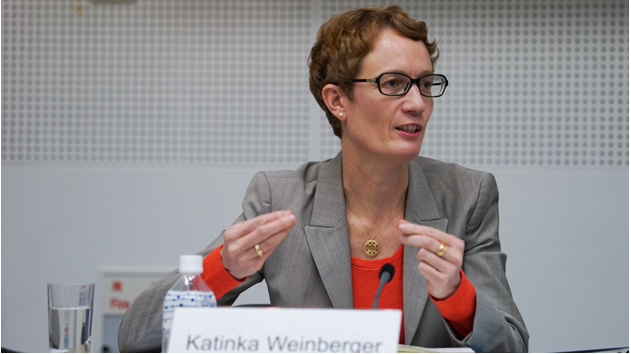2016-11-17

On 13 October 2016, as part of its SDG Dialogue series, UNU-IAS organized a discussion on Regional Institutions & the SDGs: Science, Policy & Capacity Building. The event brought together researchers and practitioners to discuss how the global 2030 Agenda for Sustainable Development and its SDGs can be translated into regional and national priorities in the Asia-Pacific region. It was organized in cooperation with the Sustainable Development Solutions Network Japan (SDSN Japan) and the Global Environment Outreach Centre (GEOC).
Farai Kapfudzaruwa (UNU-IAS) opened the event by providing the audience with an overview of science–policy links in the context of regional institutions. This was followed by a keynote speech delivered by Katinka Weinberger, Chief of the Environment and Development Policy Section of the UN Economic and Social Commission for Asia and the Pacific (UNESCAP). She pointed out the importance of regionally specific solutions, and the role for scientists to play in shaping policies to tackle the key challenges of the 2030 Agenda. She concluded by suggesting that regional science–policy interfaces could be strengthened through, for example, the creation of regional networks of academic institutions and think tanks, or through formal engagement of academic institutions in regional follow-up and review processes.
In the panel discussion that followed, Shunji Matsuoka (Professor, Graduate School of Asia Pacific Studies, Waseda University) linked the current discourse about the SDGs to previous regional environmental policymaking in East Asia, and suggested valuable lessons for the future. Prof. Atsushi Ishii (Associate Professor, Centre for Northeast Asian Studies, Tohoku University) stressed that integration of the SDGs in the Asian context could be very difficult, and that a possible way forward could include the co-production of research for the SDGs with policymakers and other stakeholders, while UNESCAP could facilitate such a process and lend legitimacy to the co-produced outcomes.
The last presentation was given by Hein Mallee (Director of the Regional Centre for Future Earth in Asia and Professor at the Research Institute for Humanity and Nature), who stressed that the SDGs were an opportunity to engage scientists, but that the existing formal and informal institutional diversity in the region was challenging. Interactive discussion with the audience revolved around questions such as UNESCAP’s capacity to facilitate research-based policymaking, the responsibility of scientists to improve the current set of SDGs, the process of delivering a regional indicator list for the SDGs, and the importance of maintaining academic freedom, while ensuring transparency in the selection of stakeholders and the process of co-production. In his concluding remarks, Norichika Kanie (Professor, Graduate School of Media and Governance, Keio University; and Senior Research Fellow, UNU-IAS) emphasized that nodes for regional dialogue, such as the Asia-Pacific Forum, were important and that much more research was needed on the institutional landscape, including how informal networks of scientists might be linked to formal networks.